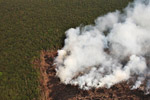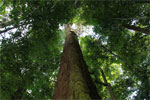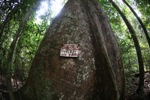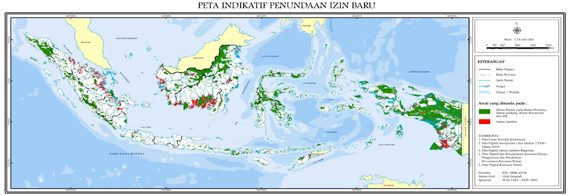Indonesia reduced the extent of areas protected under the country’s moratorium on new logging concessions, reports the Jakarta Globe.
A map released by the Ministry of Forestry on Monday lists 55 million hectares of primary forest and 17 million hectares of peatlands that are off-limits to development through December 31, 2012. The government had earlier said that 96 million hectares would be covered by the moratorium.
The new map however is far more detailed than the previous map, potentially making it more useful to policy makers. The new map consists of 291 smaller maps on a scale of 1:250,000 versus the prior version which was 1:19 million.
But the new map does not included degraded or secondary forests that are excluded from the moratorium.
Environmentalists say that without including secondary forests, Indonesia will be unlikely to meet its emissions reductions commitments.
Related articles
Is the Ministry of Forestry undermining Indonesia’s logging moratorium?

(06/28/2011) Indonesia’s Ministry of Forestry is already undermining the moratorium on new forestry concessions on peatlands and in primary forest areas, alleges a new report from Greenomics-Indonesia. The report, The Toothless Moratorium, claims that a new decree from the Ministry of Forestry converts 81,490 hectares of forest protected under the moratorium into logging areas. The area affected is larger than Singapore.
Fire detected in plantation that allegedly breached Indonesia’s moratorium
(06/28/2011) A fire is burning within a concession controlled by PT Menteng Jaya Sawit Perdana in Indonesian Borneo turning up the heat on its parent company, the Malaysia-based conglomerate Kuala Lumpur Kepong Berhad (KLK), which supplies “sustainably-produced” palm oil to companies like Cargill and is already under investigation for breaching Indonesia’s new moratorium on forest conversion, according to the Environmental Investigation Agency (EIA).

(06/27/2011) A raft of new studies show that protecting Southeast Asia’s forests could provide an enormous economic lift for Southeast Asia. Indeed, the studies suggest, forest conservation, sustainable forestry, and agricultural improvements, along with investments in clean energy, could spur the rise of regional “Green Tiger” economies whose development levels surpass even those achieved during the boom years of the 1990’s. The studies provide a striking rebuttal to palm oil and timber industries’ claims that deforestation is necessary for the region’s growth.
Indonesia’s moratorium undermines community forestry in favor of industrial interests

(06/21/2011) Indonesia’s moratorium on new concessions in primary forest areas and peatlands “completely ignores” the existence of community forestry management licenses, jeopardizing efforts to improve the sustainability of Indonesia’s forest sector and ensure benefits from forest use reach local people, say environmentalists. According to Greenomics-Indonesia, a Jakarta-based NGO, community and village forestry licenses are not among the many exemptions spelled under the presidential instruction that defines the moratorium. The instruction, issued last month, grants exemptions for industrial developers and allows business-as-usual in secondary forest areas by the pulp and paper, mining and palm oil industries.
(06/17/2011) World Resource Institute’s summary of key elements, and unanswered questions, in Indonesia’s recent moratorium on new forest permits.
Indonesia’s moratorium map has errors, says government
(06/03/2011) The map underpinning Indonesia’s moratorium on new concessions in primary forests and peatlands is “inaccurate”, an Indonesian forestry official told The Jakarta Post.








